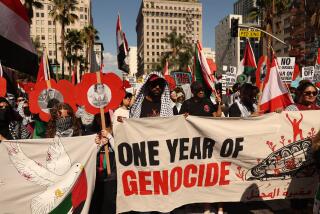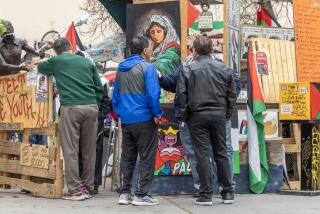Marking a Pivotal Day in Chicano Activism : Anniversary: East L.A. march commemorates anti-war event 25 years ago. Political, social issues still hold center stage.
A quarter-century ago, as the war in Vietnam raged and the spirit of the 1960s reigned, more than 20,000 people marched through East Los Angeles protesting the war, its disproportionately high numbers of Mexican American casualties and other grievances central to the then-surging Chicano movement.
That war is long over and Chicano activism has waned. But on Saturday, marchers once again took to the streets to commemorate the seminal Chicano Moratorium march of Aug. 29, 1970, an event that ended in heated battles between protesters and sheriff’s deputies and the deaths of three, including newsman Ruben Salazar. This time there was no violence, though bolstered ranks of sheriff’s deputies stood ready.
*
Despite the absence of a unifying theme as central as opposition to the Vietnam War, organizers targeted a current political climate that they said is hostile to all Latinos. The passage of Proposition 187, assaults on affirmative action and bilingual education, reduced funding for schools and the planned closing of county health clinics--all were repeatedly characterized as part of an “attack” against all Latinos.
“In many ways things are worse for our community than they were 25 years ago,” said Jaime Cruz, who participated in the 1970 protest and was an organizer of Saturday’s event, known formally as the 25th National Chicano Moratorium Commemoration and National Day of Raza Resistance. (Raza, technically “race,” is often used by activists to describe people of Mexican ancestry.)
His was a theme repeated over and over again by speakers who addressed a post-march rally beneath a broiling sun on the dusty baseball field of Ruben F. Salazar Park, renamed for the former Los Angeles Times journalist and news director at KMEX, the Spanish-language TV station. Since 1970, an explosion of immigrants from Mexico and elsewhere has transformed the Latino population in Southern California and the United States, but activists see the gains of a generation under threat.
Participants on Saturday ranged from veterans of the movimiento [movement] to youngsters not yet born when the battles erupted along Whittier Boulevard. This year’s participants followed a similar 3.7-mile route through East Los Angeles, heartland of the Mexican immigrant community. Organizers cited more than 3,000 marchers; the sheriff’s estimate was fewer than 1,000.
A column of Brown Berets, throwbacks to the Chicano movement, marched near the head of the procession. Many protesters hoisted Mexican flags and signs excoriating the Border Patrol and Gov. Pete Wilson.
“Save Our Children,” read one banner. “Deport Pete Wilson.”
Voices of Citizens Together, a San Fernando Valley group that has complained about an “invasion” from Mexico, had called for the U.S. Immigration and Naturalization Service to raid the event. But there was no sign of the INS.
Along the podium, mock coffins bore the names of, among others, Salazar, United Farm Workers founder Cesar Chavez and Jose Antonio Gutierrez--the Eastside teen-ager killed by Los Angeles police last month in an incident that touched off clashes between police and residents.
During the rally, political rhetoric ran high, reflecting the leftist orientation of the event organizers, the National Chicano Moratorium Committee, which, among other positions, calls for abolition of the Border Patrol. (Many mainstream Latino groups support a strengthened Border Patrol.) Various speakers denounced “Yankee imperialism,” the “false border” and “white supremacy.”
Conspicuously absent were elected Latino political leaders in Los Angeles.
Between sessions of barrio rap and Chicano rock, orators addressed a variety of themes, including the current turmoil in Mexico.
Others emphasized concerns closer to home. Arturo Rodriguez, a Denver high school teacher, wondered aloud about the gang carnage in Latino neighborhoods.
“There’s no Vietnam War now,” said Rodriguez, 23, “but it’s raza killing raza on the streets of our barrios. How can we address all the issues facing us when we’re so divided?”
More to Read
Sign up for Essential California
The most important California stories and recommendations in your inbox every morning.
You may occasionally receive promotional content from the Los Angeles Times.










